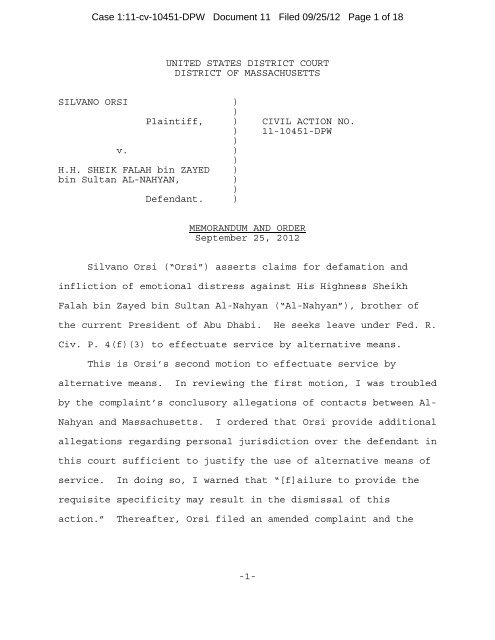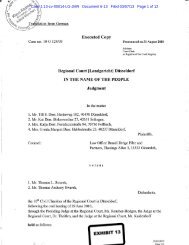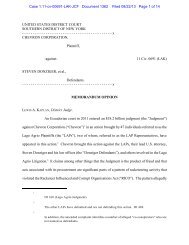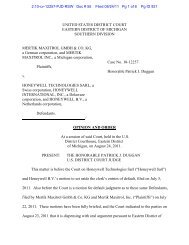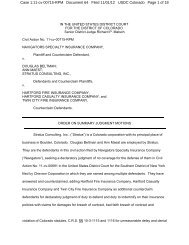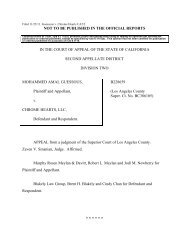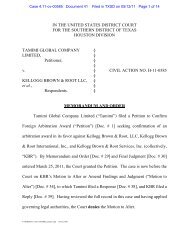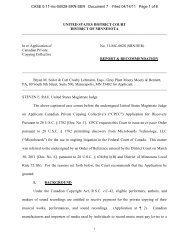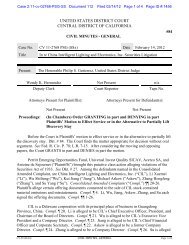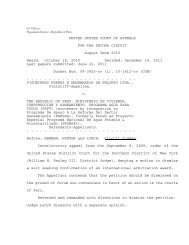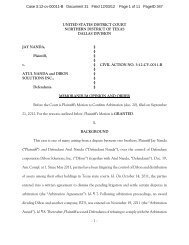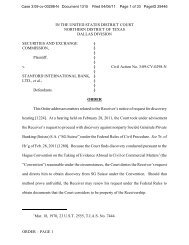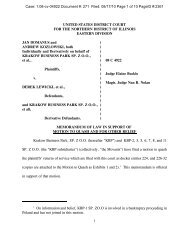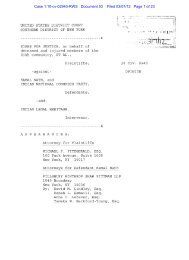Orsi v. Falah (D. Mass. 2012) - Letters Blogatory
Orsi v. Falah (D. Mass. 2012) - Letters Blogatory
Orsi v. Falah (D. Mass. 2012) - Letters Blogatory
Create successful ePaper yourself
Turn your PDF publications into a flip-book with our unique Google optimized e-Paper software.
Case 1:11-cv-10451-DPW Document 11 Filed 09/25/12 Page 1 of 18<br />
UNITED STATES DISTRICT COURT<br />
DISTRICT OF MASSACHUSETTS<br />
SILVANO ORSI ) )<br />
Plaintiff, ) CIVIL ACTION NO.<br />
) 11-10451-DPW<br />
)<br />
v. ) )<br />
H.H. SHEIK FALAH bin ZAYED )<br />
bin Sultan AL-NAHYAN, ) )<br />
Defendant. )<br />
MEMORANDUM AND ORDER<br />
September 25, <strong>2012</strong><br />
Silvano <strong>Orsi</strong> (“<strong>Orsi</strong>”) asserts claims for defamation and<br />
infliction of emotional distress against His Highness Sheikh<br />
<strong>Falah</strong> bin Zayed bin Sultan Al-Nahyan (“Al-Nahyan”), brother of<br />
the current President of Abu Dhabi. He seeks leave under Fed. R.<br />
Civ. P. 4(f)(3) to effectuate service by alternative means.<br />
This is <strong>Orsi</strong>’s second motion to effectuate service by<br />
alternative means. In reviewing the first motion, I was troubled<br />
by the complaint’s conclusory allegations of contacts between Al-<br />
Nahyan and <strong>Mass</strong>achusetts. I ordered that <strong>Orsi</strong> provide additional<br />
allegations regarding personal jurisdiction over the defendant in<br />
this court sufficient to justify the use of alternative means of<br />
service. In doing so, I warned that “[f]ailure to provide the<br />
requisite specificity may result in the dismissal of this<br />
action.” Thereafter, <strong>Orsi</strong> filed an amended complaint and the<br />
-1-
Case 1:11-cv-10451-DPW Document 11 Filed 09/25/12 Page 2 of 18<br />
supplemental motion before me now, which includes briefing on<br />
personal jurisdiction.<br />
A. Factual Background<br />
I. BACKGROUND<br />
The facts alleged by <strong>Orsi</strong> are briefly summarized as follows.<br />
On August 19, 2003, <strong>Orsi</strong> encountered Al-Nahyan in the lounge of<br />
La Reserve hotel in Geneva, Switzerland. After <strong>Orsi</strong> refused<br />
certain social invitations and sexual advances by Al-Nahyan, Al-<br />
Nahyan allegedly assaulted <strong>Orsi</strong>, whipped him with his belt, and<br />
called him a “Stupid American”--all resulting in serious physical<br />
and emotional injury. <strong>Orsi</strong> was restrained for several hours at<br />
the hotel. In the weeks that followed, he received several<br />
threats from Al-Nahyan’s “agents” in Geneva.<br />
In November 2003, fearing for his safety, <strong>Orsi</strong> went to live<br />
in his family’s home in Rome. <strong>Orsi</strong> also apparently spent some<br />
time at his family’s home in upstate New York, before obtaining<br />
an L.L.M. in 2010 at Queen Mary School of Law in London, and an<br />
L.L.M. at Boston University Law School in 2011. All the while,<br />
<strong>Orsi</strong> says Al-Nahyan’s agents continued to contact and harass him.<br />
To bolster his showing on personal jurisdiction, <strong>Orsi</strong><br />
highlights communications he received while in the United States<br />
from Alan Howell Parrot and Roman Paschal. According to <strong>Orsi</strong>,<br />
Parrot worked for Al-Nahyan’s father for over twenty years.<br />
Parrot has also been publicly critical of UAE royals, and even<br />
offered to testify in support of <strong>Orsi</strong>. Nevertheless, <strong>Orsi</strong> claims<br />
Parrot was, in fact, an agent of Al-Nahyan, who was trying to<br />
-2
Case 1:11-cv-10451-DPW Document 11 Filed 09/25/12 Page 3 of 18<br />
intimidate him by emphasizing the dangerousness and ruthlessness<br />
of the royal family, and also trying to obtain information he<br />
could relay back to Al-Nahyan. Paschal, meanwhile, is an alleged<br />
confidant of Al-Nahyan who has tried to feed <strong>Orsi</strong> salacious but<br />
false stories about the royal family and the UAE Ambassador, in<br />
hopes that <strong>Orsi</strong> would embarrass himself by attempting to exploit<br />
this information.<br />
B. Procedural Background<br />
In June 2006, Al-Nahyan was indicted in Geneva’s criminal<br />
court on charges of assault and battery, and deliberately<br />
inflicting bodily harm with a dangerous instrument. His 2008<br />
conviction was later overturned.<br />
<strong>Orsi</strong> initiated this action in March 2011, while also<br />
pursuing a civil action in Geneva seeking damages for personal<br />
injuries (“the Swiss action”). The crux of <strong>Orsi</strong>’s defamation<br />
claim is that, during and since the encounter, Al-Nahyan and his<br />
affiliates made false statements implying that <strong>Orsi</strong> is homophobic<br />
and violent. Specifically, <strong>Orsi</strong> alleges Al-Nahyan has<br />
misrepresented the events of August 19, 2003--for example, by<br />
saying <strong>Orsi</strong> provoked the encounter by calling Al-Nahyan “gay,”<br />
and that <strong>Orsi</strong> also assaulted Al-Nahyan. The claim for infliction<br />
of emotional distress, meanwhile, seems to draw on the entire<br />
course of conduct by Al-Nahyan and his agents during and since<br />
the incident.<br />
I allowed <strong>Orsi</strong> until October 17, 2011 to effect service, a<br />
deadline he attempted to meet in three ways. First, <strong>Orsi</strong><br />
-3
attempted to serve Marco Crisante, Al-Nahyan’s lawyer in the<br />
Swiss action. Second, <strong>Orsi</strong> attempted to serve Faraj Ahnish, whom<br />
<strong>Orsi</strong> calls the “self-proclaimed attorney for the royal family.”<br />
Finally, <strong>Orsi</strong> sent a copy of the Summons and Complaint by Federal<br />
Express to what <strong>Orsi</strong> claims is Al-Nahyan’s “officially designated<br />
business office” in Abu Dhabi. Crisante and Ahnish denied any<br />
authority to accept service, and <strong>Orsi</strong> received no response from<br />
the business office.<br />
I conclude that <strong>Orsi</strong> has not justified the use of<br />
alternative means of service. I base my decision independently<br />
on fundamental considerations of fairness in service of process<br />
and the additional complications of foreign service. That said,<br />
I also find that Oris’s conclusory allegations as to personal<br />
jurisdiction do not merely caution against giving him unusual<br />
tools to pursue his allegations in this court; they also<br />
demonstrate the case has no place in this jurisdiction at all,<br />
because the allegations are inadequate to support personal<br />
jurisdiction in this court.<br />
A. Standard<br />
II. SERVICE OF PROCESS<br />
Rule 4(f) prescribes the means of serving an individual “not<br />
within any judicial district of the United States.” Fed. R. Civ.<br />
P. 4(f).<br />
Case 1:11-cv-10451-DPW Document 11 Filed 09/25/12 Page 4 of 18<br />
Rule 4(f)(1) suggests internationally-agreed means such as<br />
the Hague Convention, but the United Arab Emirates (“UAE”) is not<br />
a party to that agreement, and I am not aware of any other<br />
-4
Case 1:11-cv-10451-DPW Document 11 Filed 09/25/12 Page 5 of 18<br />
agreement on service of process between the United States and the<br />
UAE. See Nabulsi v. H.H. Sheikh Issa Bin Zayed Al Nahyan, No.<br />
H-06-2683, 2007 WL 2964817, at *4 (S.D. Tex. Oct. 9, 2007).<br />
In such cases, Rules 4(f)(2) and (3) provide alternatives<br />
for service:<br />
(2) if there is no internationally agreed means, or if an<br />
international agreement allows but does not specify other<br />
means, by a method that is reasonably calculated to give<br />
notice:<br />
(A) as prescribed by the foreign country's law for<br />
service in that country in an action in its courts of<br />
general jurisdiction;<br />
(B) as the foreign authority directs in response to a<br />
letter rogatory or letter of request; or<br />
(C) unless prohibited by the foreign country's law, by:<br />
(I) delivering a copy of the summons and of the<br />
complaint to the individual personally; or<br />
(ii) using any form of mail that the clerk<br />
addresses and sends to the individual and that<br />
requires a signed receipt; or<br />
(3) by other means not prohibited by international<br />
agreement, as the court orders.<br />
Most courts agree that Rule 4(f) does not create a strict<br />
“hierarchy,” whereby a plaintiff must exhaust the methods of<br />
service suggested by Rules 4(f)(1) and (2) before the court may<br />
entertain alternative service under Rule 4(f)(3). See, e.g., Rio<br />
Properties, Inc. v. Rio Int'l Interlink, 284 F.3d 1007, 1015 (9th<br />
Cir. 2002); Forum Fin. Group, LLC v. President, Fellows of<br />
Harvard Coll., 199 F.R.D. 22, 24 & n.3 (D. Me. 2001); Nablusi,<br />
2007 WL 2964817, at *4. But it is relevant whether plaintiff has<br />
made reasonable efforts to serve defendants by conventional means<br />
before petitioning for permission to serve by alternative means.<br />
-5
See W. Supreme Buddha Ass'n, Inc. v. Oasis World Peace & Health<br />
Found., No. 08-CV-1374, 2011 WL 856378, at *1-2 (N.D.N.Y. Mar. 9,<br />
2011).<br />
Case 1:11-cv-10451-DPW Document 11 Filed 09/25/12 Page 6 of 18<br />
In the final analysis, Rule 4(f)(3) “commit[s] to the sound<br />
discretion of the district court the task of determining when the<br />
particularities and necessities of a given case require alternate<br />
service of process.” Rio Properties, 284 F.3d at 1016; accord In<br />
re Int'l Telemedia Associates, Inc., 245 B.R. 713, 719 (Bankr.<br />
N.D. Ga. 2000) (rule designed to give court “flexibility and<br />
discretion”).<br />
B. Analysis<br />
Insofar as service is designed merely to provide a defendant<br />
with notice and an opportunity to respond, see Rio Properties,<br />
284 F.3d at 1017; Mullane v. Cent. Hanover Bank & Trust Co., 339<br />
U.S. 306, 314 (1950), <strong>Orsi</strong> has made a reasonable request to<br />
effect service by alternative means. In all likelihood, Al-<br />
Nahyan is aware of this suit and <strong>Orsi</strong>’s allegations, given <strong>Orsi</strong>’s<br />
representations that Al-Nahyan’s Swiss counsel proposed a “global<br />
settlement” of both the Swiss and U.S. actions, and the fact that<br />
copies of the summons and complaint in this matter were<br />
distributed by the judge in the Swiss action to defense counsel.<br />
This suit has also received at least some mainstream news<br />
coverage. Thus, allowing service upon Al-Nahyan’s Swiss counsel<br />
would likely satisfy due process minima, broadly conceived. 1<br />
1 The same cannot be said for service to Ahnish or Al-<br />
Nahyan’s “business office.” There is no documentation that<br />
Ahnish is the “self-proclaimed attorney for the royal family,”<br />
-6-
Additional concerns are present, however, with respect to<br />
foreign service. The Advisory Committee Notes to Rule 4 caution<br />
that, when considering alternative means of service, “an earnest<br />
effort should be made to devise a method of communication that is<br />
consistent with due process and minimizes offense to foreign<br />
law.” Fed. R. Civ. P. 4, advisory committee note (emphasis<br />
added).<br />
Case 1:11-cv-10451-DPW Document 11 Filed 09/25/12 Page 7 of 18<br />
Although Rule 4(f) may not strictly require a party to<br />
exhaust all other options before requesting alternative service,<br />
<strong>Orsi</strong>–at least as far as is documented in his motion--has not even<br />
attempted to effectuate service in ways that would do less<br />
violence to UAE law. Indeed, <strong>Orsi</strong> has not demonstrated any<br />
serious effort to use accepted methods of service in the UAE, as<br />
suggested by rule 4(f)(2)(A). For example, <strong>Orsi</strong> asserts that “no<br />
courier would accept the task of serving court papers on Sheikh<br />
<strong>Falah</strong> within the territorial jurisdiction of the UAE.” But as<br />
far as appears on this record, that assertion is mere conjecture;<br />
<strong>Orsi</strong> has not documented any attempts to contact such couriers,<br />
let alone refusals on their part. Neither has <strong>Orsi</strong> attempted to<br />
use the letter rogatory process under 4(f)(2)(B), or demonstrated<br />
but only that Ahnish served as an expert witness on UAE rules of<br />
procedure in a suit against Al-Nahyan’s brother. Nabulsi v. H.H.<br />
Sheikh Issa Bin Zayed Al Nahyan, No. H-06-2683, 2007 WL<br />
2964817(S.D. Tex. Oct. 9, 2007). Similarly, <strong>Orsi</strong> asserts the<br />
“Italian Embassy in Abu Dhabi confirmed, as recently as July,<br />
2011, that . . . Defendant continues to headquarter his UAE<br />
operations at the address listed,” but he provides no<br />
documentation of this confirmation.<br />
-7-
Case 1:11-cv-10451-DPW Document 11 Filed 09/25/12 Page 8 of 18<br />
that the UAE would, for whatever reason, be unresponsive to the<br />
letter rogatory process.<br />
Instructive in this regard is Smallwood v. Allied Pickfords,<br />
LLC, No. 08-CV-2196, 2009 WL 3247180 (S.D. Cal. Sept. 29, 2009),<br />
where the court quashed service on a UAE defendant based on<br />
plaintiff’s failure to comply with UAE Civil Procedure Law--in<br />
particular, Article 5, which requires service by a court bailiff<br />
or private company appointed by the UAE Ministry of Justice.<br />
Despite these procedural hurdles, the court found that a<br />
“reasonable prospect exist[ed]” that plaintiff would still be<br />
able to serve the defendant properly. Smallwood, 2009 WL<br />
3247180, at *13-14.<br />
Although Smallwood was decided in a different procedural<br />
posture--namely, the UAE defendant’s motion to dismiss for<br />
insufficient service under Fed. R. Civ. P. 12(b)(5)--the UAE<br />
defendant made no contention that it lacked actual notice of the<br />
action or suffered prejudice, Smallwood, 2009 WL 3247180, at *12,<br />
and the court found it properly had personal jurisdiction over the<br />
UAE defendant, id. at *16. The court nevertheless quashed service<br />
based on the lack of reasonable diligence required of the<br />
plaintiff, and the importance of minimizing offense to foreign law<br />
when possible.<br />
The policy considerations are no different here. Before<br />
allowing <strong>Orsi</strong> to effect service by alternative means, I would<br />
-8
equire a stronger showing that service under UAE law or other<br />
means more respectful of the foreign jurisdiction, such as the<br />
letter rogatory process, is unavailable or at least prohibitively<br />
impractical.<br />
Case 1:11-cv-10451-DPW Document 11 Filed 09/25/12 Page 9 of 18<br />
For these reasons alone, I will deny <strong>Orsi</strong>’s motion, and the<br />
resulting failure to effect proper service by the court-ordered<br />
deadline provides grounds for dismissal of this action. 2<br />
III. PERSONAL JURISDICTION<br />
<strong>Orsi</strong>’s failure to demonstrate that Al-Nahyan has sufficient<br />
contacts with <strong>Mass</strong>achusetts to establish personal jurisdiction<br />
prompts me to dismiss the case on the alternative grounds of lack<br />
of personal jurisdiction.<br />
A. Standards<br />
1. Procedural<br />
This court has authority to dismiss plaintiff’s complaint on<br />
personal jurisdiction grounds at this stage. <strong>Orsi</strong> was placed on<br />
notice that the court might dismiss this matter for lack of<br />
personal jurisdiction if his allegations remained deficient, and<br />
the court provided an opportunity to remedy the deficiencies.<br />
2 Although the 120-day time limit for service under Fed. R.<br />
Civ. P. 4(m) does not apply to foreign service, the time allowed<br />
for foreign service is not unlimited. Feliz v. MacNeill, No.<br />
10-1549, <strong>2012</strong> WL 3590807, at *3 (1st Cir. Aug. 22, <strong>2012</strong>). The<br />
question is what is reasonable under the circumstances. Id. I<br />
extended <strong>Orsi</strong> a total of 210 days to effect service and warned<br />
that “no further extensions shall be anticipated.” <strong>Orsi</strong>,<br />
meanwhile, made only the minimal efforts at service already<br />
described.<br />
-9
I recognize that the First Circuit has said that “a district<br />
court has no authority, sua sponte, to dismiss for lack of<br />
personal jurisdiction,” Pilgrim Badge & Label Corp. v. Barrios,<br />
857 F.2d 1, 3 (1st Cir. 1988), but the statement is more limited<br />
than it sounds. In Pilgrim Badge, the defendant had waived the<br />
defense of lack of personal jurisdiction and thus, in context, it<br />
was clear the court simply held it is inappropriate to override a<br />
defendant’s waiver of personal jurisdiction. See also Uffner v.<br />
La Reunion Francaise, S.A., 244 F.3d 38, 41 (1st Cir. 2001) (“Once<br />
a party has waived its defense of lack of personal jurisdiction,<br />
the court may not, sua sponte, raise the issue in its ruling on a<br />
motion to dismiss.” (emphasis added)).<br />
More pertinently, the First Circuit has stated that<br />
a district court may, in appropriate circumstances, note the<br />
inadequacy of the complaint and, on its own initiative,<br />
dismiss the complaint. Yet a court may not do so without at<br />
least giving plaintiffs notice of the proposed action and<br />
affording them an opportunity to address the issue.<br />
Wyatt v. City of Boston, 35 F.3d 13, 14-15 (1st Cir. 1994)<br />
(quoting Literature, Inc. v. Quinn, 482 F.2d 372, 374 (1st Cir.<br />
1973)). Once the court “asks [a plaintiff] for more specifics, a<br />
serious effort to flesh out the complaint is fairly to be<br />
expected.” Pruell v. Caritas Christi, 678 F.3d 10, 14 (1st Cir.<br />
<strong>2012</strong>).<br />
Case 1:11-cv-10451-DPW Document 11 Filed 09/25/12 Page 10 of 18<br />
In Buchanan v. Manley, 145 F.3d 386, 388-89 (D.C. Cir. 1998),<br />
the D.C. Circuit applied principles similar to those set forth in<br />
Wyatt and Pruell to find harmless the district court’s dismissal<br />
-10-
Case 1:11-cv-10451-DPW Document 11 Filed 09/25/12 Page 11 of 18<br />
of a complaint, before service of process, for improper venue--an<br />
issue waivable in the same manner as personal jurisdiction--after<br />
allowing plaintiff to brief the issue for the first time on<br />
appeal. Here, <strong>Orsi</strong> has had the opportunity to supplement his<br />
allegations and briefing on personal jurisdiction. Buchanan<br />
illustrates the authority of a court, in such circumstances, to<br />
take steps “to avoid [imposing on a defendant] the burden of<br />
appearing in a case that appears clearly to have been brought in<br />
the wrong court.” Id.<br />
2. Substantive<br />
Even viewing all allegations and reasonable inferences in<br />
favor of <strong>Orsi</strong>, he does not make a “prima facie” showing of<br />
personal jurisdiction over Al-Nahyan in <strong>Mass</strong>achusetts. “[A] prima<br />
facie showing of personal jurisdiction must be based on evidence<br />
of specific facts set forth in the record. The plaintiff must go<br />
beyond the pleadings and make affirmative proof.” Boit v. Gar-Tec<br />
Products, Inc., 967 F.2d 671, 675 (1st Cir. 1992) (internal<br />
quotations and citations omitted). I will “not credit conclusory<br />
allegations or draw farfetched inferences.” Ticketmaster-New<br />
York, Inc. v. Alioto, 26 F.3d 201, 203 (1st Cir. 1994).<br />
In this diversity action, <strong>Orsi</strong> must show that personal<br />
jurisdiction is permitted under both the <strong>Mass</strong>achusetts Long Arm<br />
Statute, <strong>Mass</strong>. Gen. Laws ch. 223A § 3, and the constitutional<br />
requirements of due process. Good Hope Industries, Inc. v. Ryder<br />
Scott Co., 389 N.E.2d 76, 79 (<strong>Mass</strong>. 1979). That said, these<br />
inquiries are for the most part co-extensive because the Long Arm<br />
Statute asserts jurisdiction to the constitutional limits. Id.<br />
-11
Case 1:11-cv-10451-DPW Document 11 Filed 09/25/12 Page 12 of 18<br />
In the now-classic formulation, due process requires that a<br />
defendant “have certain minimum contacts with [the forum of suit]<br />
such that the maintenance of the suit does not offend ‘traditional<br />
notions of fair play and substantial justice.’” Int'l Shoe Co. v.<br />
Washington, 326 U.S. 310, 316 (1945) (quoting Milliken v. Meyer,<br />
311 U.S. 457, 463 (1940)). Under the “purposeful availment”<br />
requirement, a defendant must have “deliberately” created a<br />
“substantial connection” with the forum state. Burger King Corp.<br />
v. Rudzewicz, 471 U.S. 462, 475 (1985).<br />
Personal jurisdiction can be general or specific. “General<br />
jurisdiction exists when the litigation is not directly founded on<br />
the defendant's forum-based contacts, but the defendant has<br />
nevertheless engaged in continuous and systematic activity,<br />
unrelated to the suit, in the forum state.” United Elec. Workers<br />
v. 163 Pleasant St. Corp., 960 F.2d 1080, 1088 (1st Cir. 1992).<br />
“Specific personal jurisdiction, by contrast, is narrower in scope<br />
and may only be relied upon ‘where the cause of action arises<br />
directly out of, or relates to, the defendant's forum-based<br />
contacts.’” Pritzker v. Yari, 42 F.3d 53, 60 (1st Cir. 1994)<br />
(quoting United Elec. Workers, 960 F.2d at 1088–1089).<br />
<strong>Orsi</strong> cites only section 3(d) of the Long Arm Statute, which<br />
authorizes general jurisdiction over a defendant who “causes<br />
tortious injury in this commonwealth by an act or omission outside<br />
this commonwealth if he regularly does or solicits business, or<br />
engages in any other persistent course of conduct” inside the<br />
commonwealth. I will give <strong>Orsi</strong> the benefit of the doubt that he<br />
-12-
Case 1:11-cv-10451-DPW Document 11 Filed 09/25/12 Page 13 of 18<br />
also meant to invoke section 3(a), which permits specific<br />
jurisdiction "over a person, who acts directly or by an agent, as<br />
to a cause of action in law or equity arising from the<br />
person's . . . transacting any business" in <strong>Mass</strong>achusetts. 3 In<br />
any event, <strong>Orsi</strong> is far from making the specific allegations<br />
necessary to establish either general or specific jurisdiction.<br />
B. Analysis<br />
<strong>Orsi</strong>’s complaint is not a model of clarity, but I have culled<br />
what appear to be all the relevant allegations that might support<br />
personal jurisdiction over Al-Nahyan.<br />
1. <strong>Orsi</strong><br />
<strong>Orsi</strong>’s jurisdictional allegations all concern Al-Nahyan’s<br />
contacts with <strong>Orsi</strong> (as opposed to other unrelated contacts with<br />
<strong>Mass</strong>achusetts that might support general jurisdiction). As a<br />
result, the time frame for contacts establishing personal<br />
jurisdiction over the defendant in <strong>Mass</strong>achusetts is limited by<br />
when <strong>Orsi</strong> had any connection to <strong>Mass</strong>achusetts. So, before even<br />
turning to Al-Nahyan’s contacts, I must examine <strong>Orsi</strong>’s own<br />
contacts with <strong>Mass</strong>achusetts--a topic about which he provides only<br />
the slightest detail.<br />
The core allegations of the complaint travel to Switzerland,<br />
Italy, and New York. The only apparent connection to<br />
3 Despite the statutory language, the <strong>Mass</strong>achusetts test for<br />
specific jurisdiction parallels the federal. Foster–Miller, Inc.<br />
v. Babcock & Wilcox Canada, 46 F.3d 138, 144 n.3 (1st Cir. 1995)<br />
(“transacting any business” and “arising from” elements of<br />
section 3(a) of the Long Arm Statute correspond to the federal<br />
constitutional requirements of “minimum contacts” and<br />
“relatedness”).<br />
-13
<strong>Mass</strong>achusetts is <strong>Orsi</strong>’s time at Boston University Law School,<br />
where he was studying as of the filing of this action. But <strong>Orsi</strong><br />
does not even specify when he arrived in Boston, or how long his<br />
program ran. He apparently did not intend to stay for long,<br />
declaring that he planned to sit for the New York bar exam in July<br />
2011.<br />
Case 1:11-cv-10451-DPW Document 11 Filed 09/25/12 Page 14 of 18<br />
Most charitably to <strong>Orsi</strong>, I will assume he has resided in<br />
Boston from sometime in 2010, after he completed his L.L.M. from<br />
Queen Mary School of Law, until the present.<br />
2. The Precipitating Incident<br />
None of the events from August 19, 2003--the day of the<br />
incident--can establish contacts with <strong>Mass</strong>achusetts. Not only<br />
does <strong>Orsi</strong> not allege he had any connection to <strong>Mass</strong>achusetts at<br />
that time, but there is also no indication that Al-Nahyan or any<br />
of his affiliates knew of that connection, or had any idea that<br />
their statements or actions had ramifications in <strong>Mass</strong>achusetts,<br />
let alone that they intended any injury to be felt in<br />
<strong>Mass</strong>achusetts. See Burger King, 471 U.S. at 475; see also Noonan<br />
v. Winston Co., 902 F. Supp. 298, 305 (D. <strong>Mass</strong>. 1995), aff'd, 135<br />
F.3d 85 (1st Cir. 1998) (“[A] defamatory ‘effect’ by itself is not<br />
sufficient to confer jurisdiction over a foreign defendant.<br />
Rather, to make a prima facie showing, the victim of the<br />
defamatory statement must demonstrate that its author intended the<br />
libel to be felt in the forum state.”).<br />
-14-
Case 1:11-cv-10451-DPW Document 11 Filed 09/25/12 Page 15 of 18<br />
3. Subsequent Statements and Events<br />
<strong>Orsi</strong> is no more specific about what later statements or<br />
events might establish jurisdiction. His various encounters with<br />
Al-Nahyan’s alleged agents in Geneva face the same problem as the<br />
events on the day of the incident itself. There is next to no<br />
detail about what further conduct might support <strong>Orsi</strong>’s claims.<br />
One glimmer of specificity can be found in <strong>Orsi</strong>’s complaint<br />
about statements made by Al-Nahyan’s lawyer during the Swiss<br />
criminal prosecution, as well as later declarations by his lawyers<br />
and Al-Nahyan himself to the media. But, again, as to the events<br />
in the Swiss criminal action in 2006 or 2008, <strong>Orsi</strong> has established<br />
no connection to <strong>Mass</strong>achusetts before 2010. 4<br />
As for statements made to the media, <strong>Orsi</strong> provides only a<br />
single newspaper article related to his case. 5 That article is<br />
dated March 2011, and provides a potential contact while <strong>Orsi</strong><br />
resided in <strong>Mass</strong>achusetts. But the article only states that “Al<br />
Nahyan has denied <strong>Orsi</strong>’s allegations” and that Al-Nahyan’s lawyer<br />
“said previously that <strong>Orsi</strong>’s legal complaint was full of lies<br />
4 Even if <strong>Orsi</strong> were in Boston at any of the relevant times<br />
and Al-Nahyan or his lawyer knew that, and assuming <strong>Orsi</strong> also<br />
seeks to invoke <strong>Mass</strong>achusetts substantive law, statements made by<br />
Al-Nahyan’s lawyer in the course of litigation are absolutely<br />
privileged and cannot be the basis for <strong>Orsi</strong>’s defamation claim.<br />
See Correllas v. Viveiros, 572 N.E.2d 7, 10 (<strong>Mass</strong>. 1991).<br />
5 The privilege discussed in the previous footnote does not<br />
apply to statements made to the media. Robert L. Sullivan,<br />
D.D.S., P.C. v. Birmingham, 416 N.E.2d 528, 531 (<strong>Mass</strong>. App. Ct.<br />
1981).<br />
-15-
Case 1:11-cv-10451-DPW Document 11 Filed 09/25/12 Page 16 of 18<br />
meant to pressure the sheik for money.” The article thus gives no<br />
specific information as to these statements, when they were made,<br />
or the context in which they were made, let alone whether they<br />
were made with any intent to cause harm in <strong>Mass</strong>achusetts.<br />
Beyond that, <strong>Orsi</strong> says only that Al-Nahyan “repeatedly made”<br />
defamatory statements and that “[a]t all times relevant to this<br />
complaint,” Al-Nahyan engaged in “acts” that caused emotional<br />
distress. But there is no detail--let alone the required<br />
“specific facts,” Boit, 967 F.2d at 675--as to what else was said<br />
or done by Al-Nahyan, when it was said or done, whether <strong>Orsi</strong> had<br />
any ties to <strong>Mass</strong>achusetts at the time, and whether whoever said or<br />
did whatever they did had any intent to cause injury in<br />
<strong>Mass</strong>achusetts.<br />
4. The “Agents”<br />
The only exception to the otherwise complete lack of detail<br />
is in <strong>Orsi</strong>’s recitations of his interactions with Parrot and<br />
Paschal. The allegation that these individuals are “agents” of<br />
Al-Nahyan is in itself far-fetched, but I will assume for purposes<br />
here that they are in fact agents whose contacts with<br />
<strong>Mass</strong>achusetts could create personal jurisdiction over Al-Nahyan.<br />
The problem is that <strong>Orsi</strong> again fails to make a single<br />
specific factual allegation as to these agents’ contacts with<br />
<strong>Mass</strong>achusetts. <strong>Orsi</strong> describes letters from Parrot that were sent<br />
to <strong>Orsi</strong>’s attorneys abroad at times when <strong>Orsi</strong> has not bothered to<br />
-16
allege where he lived--in April 2006 and June 2008. <strong>Orsi</strong> also<br />
describes in detail on phone call he received from Parrot in April<br />
2006, but which was made to <strong>Orsi</strong>’s family home in New York. 6 The<br />
only specifically-described and documented contact with Paschal<br />
occurred in June 2008 when, again, <strong>Orsi</strong> has not alleged any<br />
connection to <strong>Mass</strong>achusetts.<br />
<strong>Orsi</strong>’s allegations beyond these contacts are not only<br />
conclusory, but evasive. For example, <strong>Orsi</strong> says that Paschal and<br />
Parrot “have continuously and deliberately contacted me in the<br />
U.S. Jurisdiction,” an allegation which conspicuously avoids<br />
specifying where in the United States any contacts occurred. At<br />
most, <strong>Orsi</strong> declares that Parrot “regularly contacted” him, but<br />
stopped in March 2011, which by implication alleges that some<br />
communication was directed into <strong>Mass</strong>achusetts while <strong>Orsi</strong> lived in<br />
Boston.<br />
Case 1:11-cv-10451-DPW Document 11 Filed 09/25/12 Page 17 of 18<br />
In the final analysis, I am obligated to refuse to credit<br />
“vague and overgeneralized assertions that give no indication as<br />
to the extent, duration, or frequency of contacts.” Johnston v.<br />
Multidata Sys. Int'l Corp., 523 F.3d 602, 610 (5th Cir. 2008).<br />
That is what <strong>Orsi</strong>’s assertions amount to. They do not adequately<br />
allege personal jurisdiction over the defendant.<br />
6 <strong>Orsi</strong> never actually specifies the location of this family<br />
home, but does provide the phone number. I take judicial notice<br />
that the “585" area code of the phone number provided corresponds<br />
to a part of western New York covering Rochester and surrounding<br />
areas.<br />
-17
Case 1:11-cv-10451-DPW Document 11 Filed 09/25/12 Page 18 of 18<br />
IV. CONCLUSION<br />
For the reasons set forth more fully above, plaintiff’s<br />
motion to effectuate service via alternative means (Dkt. No. 10)<br />
is DENIED, and the Clerk is directed to dismiss this case.<br />
/s/ Douglas P. Woodlock<br />
DOUGLAS P. WOODLOCK<br />
UNITED STATES DISTRICT JUDGE<br />
-18-


